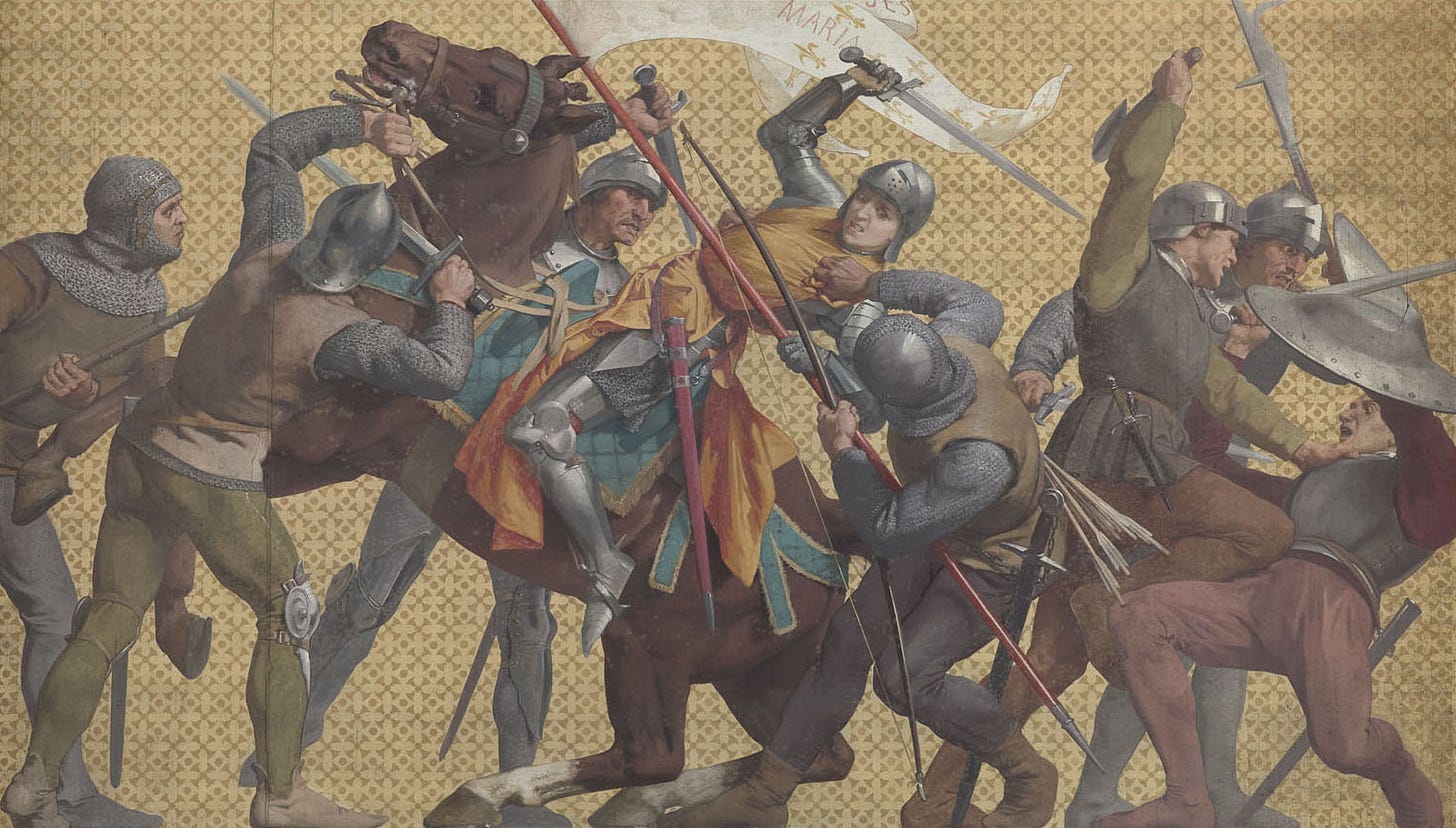If you’re interested in history and foreign affairs, Foreign Exchanges is the newsletter for you! Sign up for free today for regular updates on international news and US foreign policy, delivered straight to your email inbox, or subscribe and unlock the full FX experience:
Happy Memorial Day to those who are celebrating! I took a short break for the holiday but we’ll be back to our regular schedule tomorrow. Thanks for reading!
May 23, 1430: In the early days of their siege of the town of Compiègne, Burgundian forces drive off a sortie by the French garrison and in the process capture none other than Joan of Arc, the heroine of the siege of Orléans. The Burgundians turned Joan over to their English allies in exchange for a substantial ransom, and English authorities quickly put her on trial for blasphemy. Among Joan’s alleged crimes were claiming to have received direct communications from God and wearing “masculine” clothing, which seems inevitable if you’re going to ride into battle but I digress. The verdict was never in doubt, with England intending to discredit French King Charles VII’s claim on the throne by associating him with a “convicted” heretic. Joan was executed on May 30, 1431. As far as the siege was concerned, it ended in November 1430 with a French victory that was not terribly decisive as far as the wider Hundred Years’ War was concerned.

May 23, 1618: Two Catholic Bohemian nobles, Jaroslav Bořita of Martinice and Vilém Slavata of Chlum, are thrown out of the top floor window of the Bohemian Chancellery in Prague by a group of Protestant nobles angered over the religious policies of the Bohemian king, the future Holy Roman Emperor Ferdinand II. Both somehow survived the 70 foot drop, but this “Defenestration of Prague” (one of three such incidents but the one most people likely mean when they talk about the Defenestration of Prague) helped trigger the Thirty Years’ War.
May 24, 1667: King Louis XIV of France orders his army to invade the Spanish Netherlands, kicking off a conflict known as the War of Devolution. The name comes from Louis’ contention that sovereignty over the Spanish Netherlands and Franche-Comté had passed (“devolved,” get it?) to him because of his marriage to Spanish royal Maria Theresa. She and Louis had agreed to renounce her inheritance in return for a hefty dowry payment from the Habsburgs, but that dowry never materialized and so Louis argued that the renunciation was null and void. The war was largely concluded on French terms and ended with the May 1668 Treaty of Aix-la-Chapelle (not to be confused with the more famous 1748 treaty by the same name), under which Louis agreed to quit the Spanish Netherlands and Franche-Comté but retained possession of several key northern frontier towns. Those towns proved to be footholds for subsequent French forays into the region.
May 24, 1991: The military arm of the Eritrean People’s Liberation Front enters the city of Asmara, securing (as it turns out) Eritrea’s independence from Ethiopia and thus marking the end of the Eritrean War of Independence. May 24 is commemorated in Eritrea annually as Independence Day.
May 25, 1521: The Diet of Worms, an assembly called by Holy Roman Emperor Charles V in response to the growing “Protestant” reform movement led by Martin Luther, culminates with the Edict of Worms. In that proclamation, Charles declared Luther “a notorious heretic” and promised that “those who will help in his capture will be rewarded generously for their good work.” Frederick III, Elector of Saxony, then “kidnapped” Luther and stashed him in Wartburg Castle for his own safety. Luther remained at Wartburg until the following March, writing and translating the New Testament into German while his reform movement escalated into a schism and Protestantism began to separate from the Catholic Church.
May 25, 1981: Leaders from Bahrain, Kuwait, Oman, Qatar, Saudi Arabia, and the United Arab Emirates sign the Gulf Cooperation Council charter in Abu Dhabi, formally marking the birth of that organization.
May 26, 1908: A British drilling operation discovers a commercially-viable oil deposit at Masjed Soleyman, in Iran’s Khuzestan province. This was the first oil find in the Middle East and obviously began the region’s transformation into the stable, economically advantaged paradise it is today. The strike was made under the terms of the “D’Arcy Concession,” a 1901 agreement between British oil baron William Knox D’Arcy and Iranian ruler Mozaffar al-Din Shah Qajar that gave D’Arcy exclusive rights to explore for oil in Iran in exchange for a payment of 20,000 pounds and a mere 16 percent of any future profits. Let’s just say this led to some problems down the road and leave it at that.
May 26, 1918: The short-lived Democratic Republic of Georgia declares independence from the considerably shorter-lived Transcaucasian Democratic Federative Republic, which in turn formed out of the collapse of the Russian Empire. Although Georgia fell to a Red Army invasion in early 1921 and became a Soviet republic, this not-quite-three year period of independence was formative in terms of the development of Georgian nationalism, and after the country regained its independence from the USSR the Georgian government established May 26 as Independence Day.

